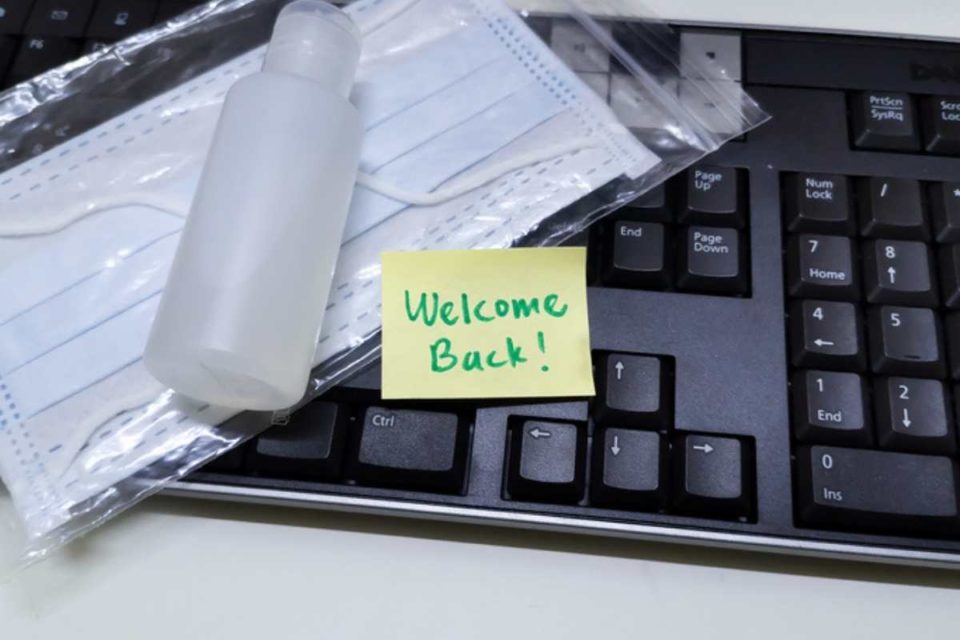April 23, 2022
Returning to Work: Managing Social and Separation Anxiety
Written by Marcus Flores
Posted in Anxiety and with tags: covid-19, work from home, workplace issues

We have all been living through it, so it goes without saying that the coronavirus has changed life as we know it. For the past year at least many people around the country have been working remotely.
After a year of working from the kitchen table or home office, it is perhaps unsurprising that 67% of workers feel anxious about returning to the office.
There are many causes of this anxiety, ranging from separation anxiety from home and family life and fears of socializing again, to mental illness struggles caused by working in isolation for so long and the worries of how to manage these well in an office environment.
If you are feeling anxious about returning to work, it’s important to know you are not alone. In this article, we will be discussing how to manage social and separation anxiety with the return to work.
What Causes Social Anxiety?
After over a year spent at home with minimal in-person social interactions, many of us are nervous about integrating back into society. However, returning to work in the office is providing many people with no other option than to simply get on with it.
Social anxiety can be crippling. Research shows, it is “a persistent fear of one or more social or performance situations in which the person is exposed to unfamiliar people or to possible scrutiny by others.”
Many people suffering from social anxiety struggle with irrational thoughts, often finding their imaginings spiraling out of control until the thought of going into a social situation isn’t just anxiety-evoking but feels impossible.
How to Cope with Social Anxiety in the Office
Managing normal feelings of anxiety around the first day back at work is nerve-wracking enough, let alone the addition of social anxiety. To help you out, below we have listed some of the best ways you can cope with social anxiety and the return to work.
Focus on Other Things
Often, feelings of social anxiety aren’t back-of-the-mind afterthoughts. Instead, they are ever-present worries that people fixate on. A great way to manage social anxiety when returning to work is to focus on other things.
Sounds simple, right? It’s really not.
However, with some practice, you can definitely pull it off!
If you are nervous about walking back into the office and seeing all your old colleagues in the flesh, give yourself something to think about other than your worries. You could try one of the following techniques:
- Spot all the colors of the rainbow in the room
- Count how many chairs there are
- Focus on your breathing (breathing in for five, holding for five, and breathing out for five).
These are just a couple of tactics that should help focus your thoughts on something other than all those worries!
Take a Walk
When you feel anxious at work, it is easy to sit at your computer all day long watching the minutes tick by until you can return home again. However, this can be detrimental to your mental health.
One of the best ways you can manage anxiety is by getting out for a walk during the day. Walking and spending time outdoors has numerous mental health benefits and can be a great way to ease your nerves and anxiety.
Why not use your lunch break to wander the town or take a walk through the park?
Remember: You are Not Alone
When you struggle with social anxiety, or anxiety of any sort really, it is easy to convince yourself that you are the only one.
However, the reality is very different. And particularly now, since coronavirus and all the anxieties it has stirred up, there are many people who are worried about interacting with people face-to-face again and adjusting to life in the office once more.
Taking a moment to remember this is a great way to manage your rising social anxiety and reduce those feelings of isolation.
Bring it Out into the Open
Anxiety in any form is something that is often suffered alone. The assumption is often that your fears are too strange or complicated to explain and that other people simply won’t understand. Anxiety makes us isolate ourselves from those in our lives and push away when people offer help.
Talking about your social anxiety by confiding in a friend or family member or sharing with a work colleague is a great way to help ease some of your fears. Not only does it help that someone else knows what you are going through, but it provides reassurance that you have someone who understands and who you can call on when things are tough.
What Causes Separation Anxiety?
When people think of separation anxiety, they often conjure images of dogs whimpering and barking until their owners return home or children crying when dropped off at the school gates.
However, separation anxiety is something that can continue into adulthood and while symptoms are very similar to those witnessed in children, for adults separation anxiety is often around being away from family, spouses, friends, or the home.
Adults experiencing separation anxiety may experience elevated levels of anxiety and even panic attacks. Managing these symptoms can be very difficult and many people with separation are extremely nervous about returning to the office.
Some of these anxieties can include feelings of:
- Stress and anxiety about being away from home or loved ones.
- Physical symptoms such as an upset stomach, headaches, nausea, or vomiting.
- A constant fear that something bad will happen while you are away.
- High levels of stress and anxiety.
Since lockdown and remote working has forced people to spend far more time at home and with their families, it is no surprise that employees are nervous about leaving their homes and their families to return to the office.
How to Manage Separation Anxiety at Work
Many employees returning to work will be struggling with separation anxiety, particularly for the first few weeks or months as they adjust. Employers must show understanding and be flexible where possible. A few helpful ways separation anxiety can be managed effectively in the office include:
Share Your Worries
Sharing your mental health struggles with your employer or even your colleagues can feel daunting, but it’s often one of the best things you can do to manage your symptoms in the office. We recommend arranging a meeting with your employer where you can discuss your concerns and make a plan for a smooth transition back to work.
When your employer and colleagues know you are struggling with anxiety, they are often more lenient and understanding, helping support you, however, they can with your return to work.
Opt for Flexible Working
If you struggle with separation anxiety and you are stressed about returning to the office, opting for flexible working can be a great way to ease yourself back into work.
Flexible working will differ from company to company.
However, for most, it means you have control over things like your working hours and whether you work from the office or work from home. Flexible working is a great way to manage your separation anxiety and feel more in control of such a big change.
Make a Plan
Returning to the office is daunting for everyone but when you suffer from separation anxiety, the thought of returning to work can keep you up at night for weeks in advance.
Having something to look forward to is a great way to ease your anxieties and focus on the positives. We suggest making a plan where you schedule your time and add activities to do after work that you love.
First day back in the office complete?
Take yourself for ice cream or meet up with friends. Simply having something to look forward to is a great way to manage separation anxiety and focus on the positives rather than be overwhelmed by your fears.
Final Words
The return to work is an anxious time for everyone. However, when you struggle with social and separation anxiety it can feel even more challenging.
We hope this article has provided some useful advice to help manage your symptoms. But most importantly, we hope it has been an encouragement that you can do this and a reminder that you are not alone.
To get started with an Eddins Counseling Group anxiety or social anxiety therapist in Houston, Montrose, or Sugar Land, call (832) 559-2622 or text (832) 699-5001 us today!
5 Ways to Reduce Anxiety
Get instant access to your free ebook.
Grounding & Self Soothing
Get instant access to your free ebook.
Create Healthier Thoughts & Feelings
Get instant access to your free ebook.
Why You Feel This Way
Get instant access to your free ebook.
















